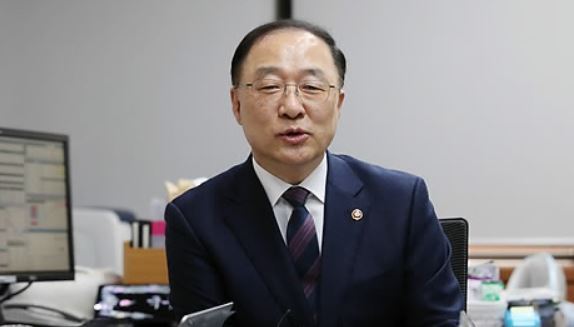The finance minister nominee said Monday that he will work on a set of measures aimed at boosting the country's growth potential, with a focus on improving dismal job conditions.
"My task is to help maintain the country's growth potential at a stable level, and I have to lay the foundation for it to be raised going forward," Hong Nam-ki told reporters in Seoul.
 |
(Yonhap) |
President Moon Jae-in named Hong the country's next finance minister Friday, sacking the incumbent Kim Dong-yeon.
He is set to face a parliamentary hearing later this month.
Hong said last week that Asia's fourth-largest economy is currently in a transitional period, stressing that the country needs to take steps to carry out necessary economic reforms.
The nominee also said last week the government will announce a plan by the end of the year to bolster the competitiveness of key industries while acknowledging that this year's growth will not meet the government's earlier expectations.
The finance ministry has maintained that the economy will grow by 2.9 percent this year and 2.8 percent in 2019, but the National Assembly Budget Office, the Bank of Korea and the Korea Development Institute all are predicting lower growth of around 2.7 percent this year.
Slack investment in facilities, coupled with the worsening job market, are major factors behind the lowering of the expected growth estimates.
Facility investment rebounded in September, gaining 2.9 percent on-month, following a 1.6 percent on-month drop in August.
But between March and August, corporate spending took a downward path, raising concerns that Asia's fourth-largest economy is heading into a slowdown, with private spending also showing signs of a slump.
Hong also said current job conditions are a grave concern.
"Jobs data may be the most important sign that determines the future economic policies," Hong said.
The country added 45,000 new jobs in September following 3,000 in August and 5,000 in July.
Korea Development Institute, a state-run think tank, earlier predicted that the number of newly added jobs will be around 100,000 next year, higher than this year's estimated 70,000.
In the first nine months of the year, some 100,000 new jobs were added.
Earlier, the finance ministry cut its job creation target to 180,000 this year and 230,000 next year. (Yonhap)








